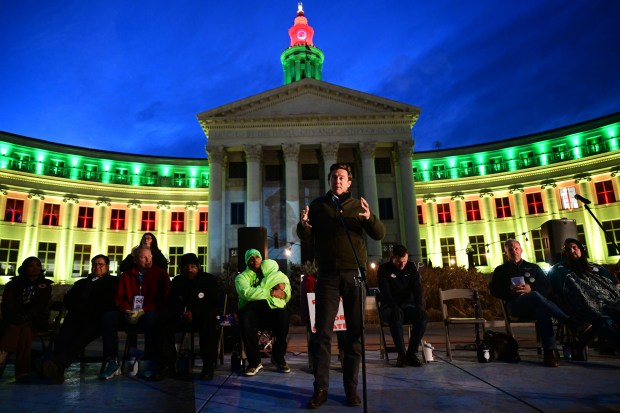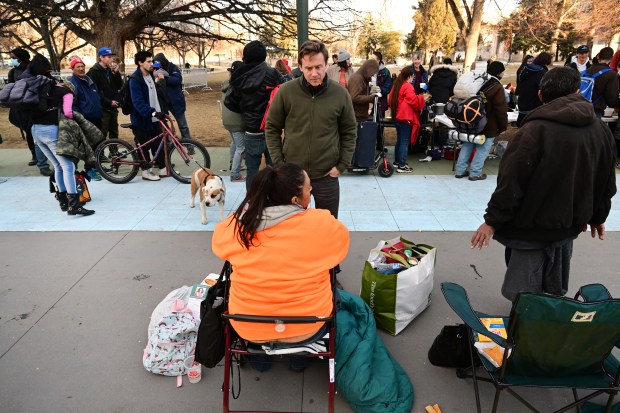Editor’s note: This represents the opinion of The Denver Post editorial board, which is separate from the paper’s news operation.
Over the past month, The Denver Post editorial board spent 45 minutes each with 15 of the 17 candidates for Denver mayor.
We agonized with them about the toll of escalating youth violence, the conditions our unhoused neighbors endure, the risk of a failing urban core, and the innumerable ways the city’s next mayor can make things better for a city of 715,000 people anxiously awaiting change.
Every candidate brought passion, unique skills, specific expertise, and an ability to lead.
Mike Johnston stood out even in this field of stars.
Johnston, a 48-year-old father of three who lives in Central Park, is ready to be the mayor of Denver.
With urgency, he will fight for this city, the way he fought at the state Capitol as our representative, the way he fought as a teacher for his students, the way he fought for winning ballot measures to fund universal kindergarten and affordable housing.
His record of independence is unimpeachable. Johnston, like two other candidates, has outside money pouring into an independent expenditure committee — exempt from the city’s campaign contribution limits — but the city will likely not do direct business with these donors in the future (if they do it should be treated as a conflict of interest under the city’s policy). The donors also are being disclosed by name, unlike one committee, and include Kent Thiry, Michael Fries, Reid Hoffman, Steve Mandel, Laura Arnold, and John Arnold.
Johnston has been a teacher, a principal, and a state lawmaker. For the last several years, he led a charitable trust that made a demonstrable difference in the lives of Coloradans. Johnston’s work resulted in ballot measures that funded universal preschool with a nicotine tax and funded affordable housing projects using a small share of expected TABOR refund dollars.
Most impressive was the COVIDCheck program launched during the pandemic. Many Colorado communities and schools used COVIDCheck for fast turnaround results, which started in July 2020 as a pilot program with Aurora Public Schools. COVIDCheck was able to use money from both Gary and the state to set up rapid testing on a limited basis with some employers throughout the state.
He is an executive who knows how to develop and implement policy.

Johnston’s message of confident optimism will resonate through a city in need of hope and in a time of divisiveness when a moderate approach can unite us, whether the question is density and development or police brutality and escalating crime.
The best example is his approach to the opioid crisis.
Johnston will convert two pods of the Denver County jail into a drug rehabilitation center and a mental health care facility staffing them with 10 trained medical professionals to provide care. He estimates the cost of the staff will be about $1 million a year, and like all of his plans, he has a funding source in mind.
Those caught using drugs in Denver – open drug use has become a common occurrence in the city – will be ticketed and summoned to court. While it’s a misdemeanor to possess drugs, Johnston says a judge can still sentence someone to 180 to 360 days for the offense, especially if it’s their third ticket in a short time or they failed to appear.
“It just requires actually using the policies,” Johnston said, noting 180 days is long enough to offer a robust drug treatment program. “Which I think you could get DAs and judges to do if they had a place to sentence them that was actually healthy.”
The unintended consequence of decriminalizing drug possession is that drug court – the only tool to force people into rehabilitation or require sobriety through regular drug tests – collapsed when DAs and prosecutors stopped seeking charges without a felony charge to pursue.
Society should not brand someone struggling with addiction a felon and put them in jail to suffer withdrawal without care, but we also are dealing with an unprecedented overdose crisis that is killing thousands.
Johnston’s plan threads the needle. He will help those suffering from addiction get the help they need through diversion programs that actually provide drug treatment and don’t leave recovering individuals with a stigmatizing criminal record.
During our interview with Johnston, every plan had this level of specificity.
We didn’t agree with him on everything, but we could see the reason and logic behind his approach, the research and care that went into developing the plan, and, critically, a willingness to adjust and be flexible as needs arise and circumstances change.

His plan to build several tiny home villages – available to those who are chronically homeless and refusing shelter regardless of sobriety, felony conviction, or mental health needs – is a compassionate way to address the encampments that have taken over some public spaces downtown. It’s similar to the plan Marty Zimmerman – candidate for at-large City Council — has to create sanctioned camping zones, and we think the two plans could work well together.
Johnston is going to invest in Denver kids. One part of his plan to curb youth violence is simple: give low-income families in Denver $1,000 for after-school activities. Denver is bursting with opportunities for kids, but only those with the financial means can participate in many of the programs.
Johnston will rebuild the Department of Public Safety.
“It’s sort of a doom loop where right now morale is low, and population is low. So now you have to work three shifts, and it makes morale even lower. And now you are being vilified by the public,” Johnston said. “Part of this is leading a really high-profile cheerleader-in-chief-as-mayor effort to make them want to work in Denver again and to say to officers and first responders that: ‘This city needs you. We are calling you to service.’ There are a lot of folks who are unemployed or underemployed in this city who could be called to that if they thought it was worthwhile, but it does take a real concentrated effort to make this a dignified job again and rebuild that trust again.”
No other candidates talked about community policing and empowering officers to do good work the way Johnston did.
The department is still struggling with the culture that led to excessive force during the Black Lives Matter protest and a lack of training that led to an officer accidentally shooting innocent victims on a bar patio.
However, at the end of the day, Johnston is right that our department will only deteriorate and tragic incidents worsen if we can’t recruit qualified, talented, diverse officers who want to serve for the right reasons.
And as much as we wish there were no need for a robust police presence in this city, the gun violence we are experiencing tells us that we need officers out there every night responding to calls and working to build cases against the leaders of crime.
Johnston blundered in sending out mailers to predominately Black and Latino neighborhoods that said “Black Votes Matter,” and then sending out mailers to other neighborhoods that said “All Votes Matter.” The mailers were in poor taste, given that the phrase “All Lives Matter” directly implies that there is no police brutality problem in this country when we see evidence every day across the nation that there is a dire problem. Johnston has apologized unequivocally for the mailers and said emphatically does not support the intended message behind All Lives Matter.
] Voters who are unsure if Johnston is the right candidate because of his support for police and his mistake should look at his robust equity policies aimed at rectifying the harm caused by more than a century of Jim Crow policies fueled by systemic racism. Equity is one of four key areas Johnston will emphasize in office. He has already seen success outside of the mayor’s office, launching the Dearfield Fund for Black Wealth, which provides $40,000 in down payment assistance for Black families to buy homes. The fund only is repaid when a house is sold or refinanced, and equity is available to pay back the assistance plus 5% of the house’s appreciation. Finally, Johnston has the integrity needed to clean up City Hall. For too long special interests have held more weight at the building than Denver residents.
He talks candidly about the fact that developers and homebuilders expect to make around 18% to 22% profit on projects in Colorado, and he will scrutinize those deals. Johnston also pledged to appraise the value of the easement on the Park Hill golf course if voters reject the proposal in Proposition 2O to lift the easement.
Voters will have many options when their ballots arrive this week. We hope they consider supporting Johnston.
Sign up for Sound Off to get a weekly roundup of our columns, editorials and more.
To send a letter to the editor about this article, submit online or check out our guidelines for how to submit by email or mail.
Updated March 16, 2023 at 2:08 p.m. Due to an editor’s error, this story originally described the Dearfield Fund for Black Wealth inaccurately. The down-payment assistance is repaid plus 5% of the home’s appreciation.
Updated May 15, 2023, at 2:08 p.m. Due to an editor’s mistake, this editorial originally contained the wrong date that COVIDCheck began administering tests. The program launched as a pilot in July 2020 with Aurora Public Schools. Also, context was added to accurately reflect the size and nature of the COVIDCheck program.









